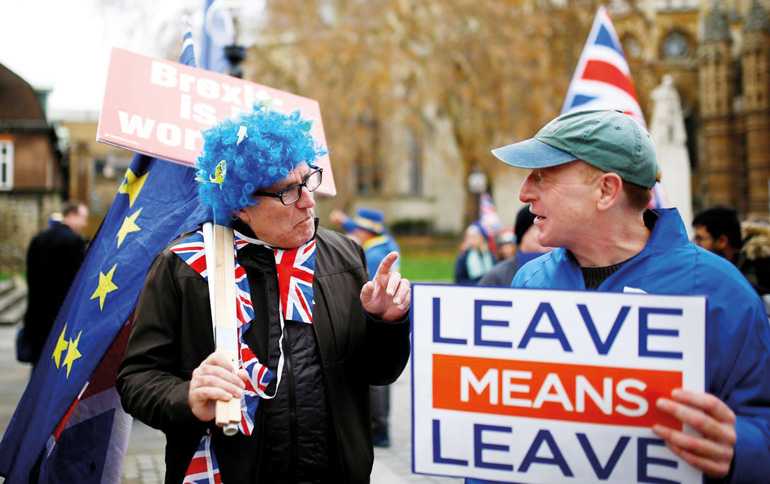Tuesday Feb 17, 2026
Tuesday Feb 17, 2026
Monday, 10 December 2018 00:00 - - {{hitsCtrl.values.hits}}

London (Reuters): It might not feel like it, but Britain’s economy got lucky after the shock of the Brexit referendum result in 2016.
Although it quickly went from being the fastest-growing major rich economy to one of the slowest, the hit would have been worse if Britain’s main trading partners in Europe hadn’t started to grow strongly around the same time.
Now, as Britain faces the risk of a chaotic no-deal Brexit from the European Union in March, it can no longer count on its neighbours to provide a shock absorber as fears of a global slowdown roil financial markets.
Prime Minister Theresa May has warned of the risk of a no-deal Brexit if, as widely expected, members of Parliament reject her plan in a vote in parliament scheduled for Tuesday.
“It was incredibly lucky timing for the UK,” Amit Kara, an economist with the National Institute of Economic and Social Research (NIESR), a think tank, said, referring to the supportive backdrop for Britain after the Brexit vote in 2016.
The euro zone went on a surprisingly strong run of growth shortly afterwards and had its best year in a decade in 2017.
Without the big rebound in Europe and the world economy, Britain’s economy would have grown about 1.2% in 2017, according to NIESR estimates, rather than the 1.7% it managed which itself was the slowest increase since 2012.
“We can’t count on that at all now. It was very unusual,” Kara said.
In the third quarter of this year, growth in the euro zone slowed to just 0.2%.
Some of that was due to one-off factors, including the introduction of new pollution rules that hit German car output.
On Thursday, the European Central Bank will likely lower its growth forecasts for the 19 economies that share the currency and take a generally cautious view about the outlook even as it brings its 2.6 trillion euro bond purchase scheme to an end.
It is expected to stress that Europe’s slowdown is more of a normalisation than a downturn, so it will remain on course for its first interest rate hike late next year.
In the United States, investors have been spooked by a recession warning sign in the bond markets as well as by trade tensions between the United States and China.
Still, the US economy continues to create jobs, and wages are rising at the fastest pace since the financial crisis.
Growth peak
But higher US interest rates are weighing on the housing market, and investment by companies is slowing.
China, the world’s second-biggest economy, looks set to lose more momentum next year as it feels the strain from Trump’s tariff push and its own structural reforms.
The Organisation for Economic Coordination and Development last month lowered its forecasts for the world economy, saying it now believed growth had probably peaked in 2018.
While a chaotic Brexit could deliver a severe shock to Britain — the Bank of England’s worst-case scenario sees a recession worse than the one that followed the global financial crisis — it is unlikely to deliver a big blow to the rest of Europe or the global economy.
The OECD says countries that rely heavily on exports to Britain, chief among them Ireland and the Netherlands, could take a few years to adjust to new obstacles to trade.
But the hit to the euro zone as a whole would be about one-third of that for Britain’s economy, the OECD estimates.
If Britain manages to avoid the disruption of a no-deal Brexit, continued sluggish growth is likely to be as good as it gets for the next few years at least.
A Reuters poll of economists pointed to growth of 1.5% in 2019 and 2020, around half its average before the financial crisis.
That would leave Britain lagging again behind the world’s developed economies which are expected to grow by 1.9% in 2019, down from 2.3% in 2018, according to HSBC, adding to the challenges of life outside the EU.
“When that growth fades out, it’s pretty bad news for the countries that need to be carried along,” James Pomeroy, an economist with HSBC, said. “If you’re tied to the developed markets which are weaker, be it Europe, be it the US, then it’s much, much harder to grow.”